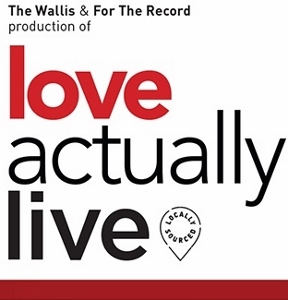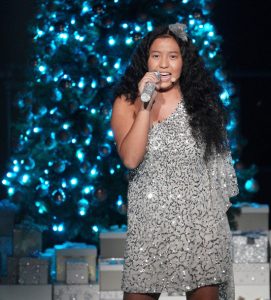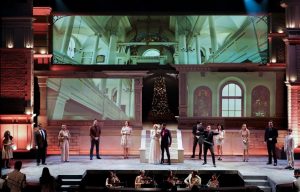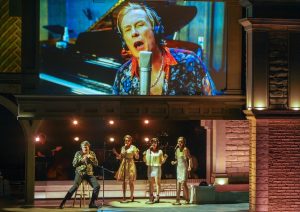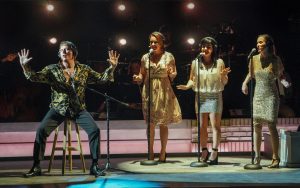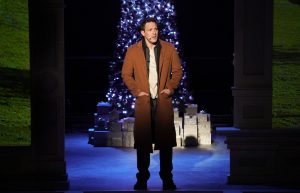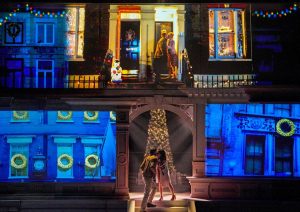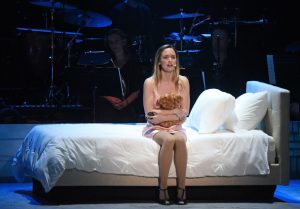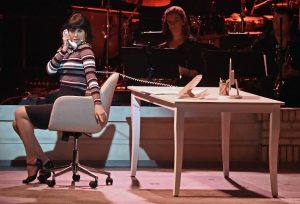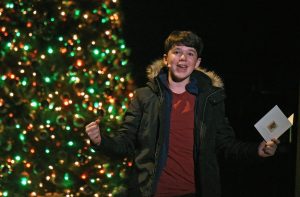ACTUALLY MAGICAL
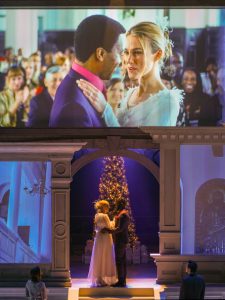 I didn’t have any idea what to expect from this hybrid theatrical invention. It employs scenes from the beloved Richard Curtis film Love Actually, live musicians (who often arrive onstage as characters), and stage actors who act out some of the scenes and then sing songs from the soundtrack as well as a few additional numbers.
I didn’t have any idea what to expect from this hybrid theatrical invention. It employs scenes from the beloved Richard Curtis film Love Actually, live musicians (who often arrive onstage as characters), and stage actors who act out some of the scenes and then sing songs from the soundtrack as well as a few additional numbers.
That it works so well is a lovely holiday surprise. That it transports the audience so deeply is, I think, the result of the evident passion of director and adaptor Anderson Davis. This idea could easily have gone horribly wrong, and it relies on ample financial support, multimedia wizardry, and what must have been a Santa’s workshop of lawyers getting music, film, and union clearances. Somehow Mr. Davis managed to convince a large number of people that his vision would work. Largely, I imagine, because of his extraordinary and singular enthusiasm bordering on obsession for the film and its soundtrack.
That he seems fixated is what makes it a transformative experience.
It reminds me of a couple of other unrelated artistic phenomenon: the international singing star Sarah Brightman and a British show on Channel 4 called Flowers. I don’t mean this in terms of tone or artistic level of achievement. It is about the power of obsession to carry away an audience.
Ms. Brightman envisioned a corner of show business where she could cover herself in body glitter and fly around arenas above thousands of people all over the world, carefully intoning songs like “A Whiter Shade of Pale” in a breathy soprano. Through sheer force of will she manages to carry audiences away, transporting them through the power of her obsessions.
The writer and creator of Flowers, Will Sharpe, takes imagery from Japanese cinema, ideas from anime, parts of his own Japanese/British background, and links between artistry and bipolar disorder and creates a tragicomedy that is epic and always on the verge of toppling over. His obsessions are endlessly compelling.
I mention those two examples because they exist apart from other creative genres and cannot be replicated by others. With Love Actually Live my sense is that Anderson Davis is in a similar space. He might be able to do it again with another project, but I have a hard time imagining anyone else pulling it off.
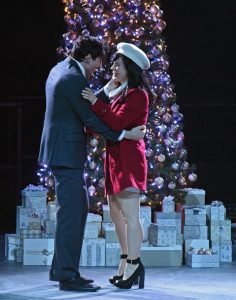 The production is wholly successful, born from a tremendous spirit of play throughout, and the iron discipline of artists giving their all. The design team does an extraordinary job of integrating the various elements with seamless elegance, with special kudos to sound designer Benjamin Soldate, vocal designer AnnMarie Milazzo, and conductor Jesse Vargas.
The production is wholly successful, born from a tremendous spirit of play throughout, and the iron discipline of artists giving their all. The design team does an extraordinary job of integrating the various elements with seamless elegance, with special kudos to sound designer Benjamin Soldate, vocal designer AnnMarie Milazzo, and conductor Jesse Vargas.
The singing is perfection. The performers retain the storytelling power of stage musicals while staying firmly within the pop music form. The women are especially compelling, with star turns from Carrie Manolakos as Natalie (the character played by Martine McCutcheon in the film, who is in love with Hugh Grant as the prime minster) Olivia Kuper Harris as Aurelia (the Portuguese housekeeper who falls for Colin Firth); and Rumer Willis in two roles, Juliet (the newlywed played by Keira Knightley) and Mia (the predatory siren who tempts the late Alan Rickman).
I suppose a couple of the projections seem more New York than London. Sometimes it is hard to remember who everyone is (though many visual clues are given). A couple of the musical sequences go a little longer perhaps than necessary. The thing is, you just don’t care. Once you give yourself over to Anderson Davis and his mad intensity, nothing else matters.
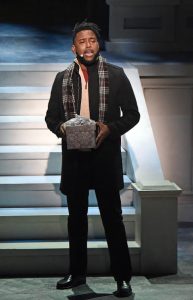 photos by Lawrence K Ho and Kevin Parry
photos by Lawrence K Ho and Kevin Parry
Love Actually Live
For the Record and The Wallis
Bram Goldsmith Theater
Wallis Annenberg Center for the Performing Arts
9390 N. Santa Monica Blvd.
ends on December 31, 2018
for tickets ($35-$125), call 310.746.4000 or visit The Wallis
